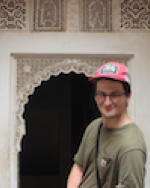
Lloyd Farley, completing a BDP in Environment & Sustainability, spent his summer in Marrakech, Morocco as an intern for the High Atlas Foundation, focusing on sustainable, local agriculture and community-led development.
"The most rewarding aspect of my Connecting Experience was being able to learn about the importance of participatory development, which allows for the people most invested in a project – the community – to be in the driver seat."
How did you find your internship?
I did research into the different non-governmental organizations in Morocco that have recently received funding from USAID.
Describe the work you did in your internship.
I managed social media, wrote blog posts and assisted at work sites.
What was the most rewarding aspect of your Connecting Experience?
The most rewarding aspect of my Connecting Experience was being able to learn about the importance of participatory development, which allows for the people most invested in a project – the community – to be in the driver seat.
In what ways has this Connecting Experience shaped your plans for the future?
My Connecting Experience has given me a taste for working in the field of development, but most importantly the participatory development method we used confirmed the importance of localized development that requires deep qualitative and localized knowledge. Anthropology is key in collecting just those types of data sets and its refreshing to see how my education can be applied outside of the university.
Discuss the relationship you had with your faculty mentor and how they helped you during this Connecting Experience.
My faculty mentor, Professor Jason Cons, has been key in helping me develop almost every factor in this project. Without my mentor, I would have had little knowledge of how to find a reputable organization and even which places in the world I should start looking. Having a faculty mentor who was also a past professor of mine (for classes such as Political Ecology) has been integral in developing my skill and knowledge base as an anthropologist, both of which I brought into the field with me and benefited from immensely.

